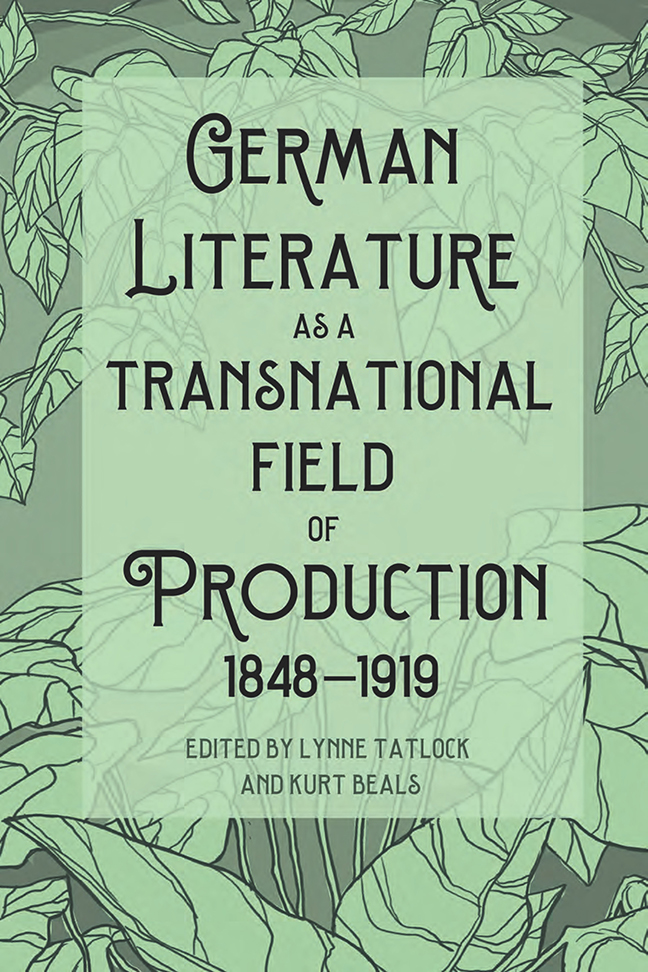Book contents
- Frontmatter
- Contents
- Acknowledgments
- Introduction: A Transnational Literary Field in the Age of Nationalism
- 1 The Passion of Johannes Scherr: Historiography as Trauma
- 2 Between Integration and Differentiation: On the Relationship between German and Austrian Literature in the Second Half of the Nineteenth Century
- 3 Reading Stifter in America
- 4 Travel Writing and Transnational Marketing: How Ida Pfeiffer brought the World to Austria and Beyond
- 5 Ernst Brausewetter's Meisternovellen Deutscher Frauen (1897–98): Gender, Genre, and (Inter)National Aspiration
- 6 Arbiter of Nation? The Strange Case of Hans Müller-Casenov's The Humour of Germany (1892/1893)
- 7 Visualizing the End: Nation, Empire, and Neo-Roman Mimesis in Keller and Fontane
- 8 Eurocentric Cosmopolitanism in Thomas Mann's Buddenbrooks
- 9 European Peace from a Transatlantic Perspective: Victor Hugo and Bertha von Suttner
- 10 Hermann Graf Keyserling and Gu Hongming’s Ethics of World Culture: Confucianism, Monarchism, and Anti-Colonialism
- 11 Constructing Symphonic Worlds: Gustav Mahler, Weltliteratur, and the Musical Program
- 12 The Garb of National Literature: Transnational Identities and the Early Twentieth-Century Schriftstreit
- 13 From European Symbolism to German Gesture: The International and Transnational Nationalism of Stefan George's Blätter für die Kunst
- 14 Canon Fire: Dada's Attack on National Literature
- Selected Bibliography
- Contributors
- Index
11 - Constructing Symphonic Worlds: Gustav Mahler, Weltliteratur, and the Musical Program
Published online by Cambridge University Press: 10 January 2024
- Frontmatter
- Contents
- Acknowledgments
- Introduction: A Transnational Literary Field in the Age of Nationalism
- 1 The Passion of Johannes Scherr: Historiography as Trauma
- 2 Between Integration and Differentiation: On the Relationship between German and Austrian Literature in the Second Half of the Nineteenth Century
- 3 Reading Stifter in America
- 4 Travel Writing and Transnational Marketing: How Ida Pfeiffer brought the World to Austria and Beyond
- 5 Ernst Brausewetter's Meisternovellen Deutscher Frauen (1897–98): Gender, Genre, and (Inter)National Aspiration
- 6 Arbiter of Nation? The Strange Case of Hans Müller-Casenov's The Humour of Germany (1892/1893)
- 7 Visualizing the End: Nation, Empire, and Neo-Roman Mimesis in Keller and Fontane
- 8 Eurocentric Cosmopolitanism in Thomas Mann's Buddenbrooks
- 9 European Peace from a Transatlantic Perspective: Victor Hugo and Bertha von Suttner
- 10 Hermann Graf Keyserling and Gu Hongming’s Ethics of World Culture: Confucianism, Monarchism, and Anti-Colonialism
- 11 Constructing Symphonic Worlds: Gustav Mahler, Weltliteratur, and the Musical Program
- 12 The Garb of National Literature: Transnational Identities and the Early Twentieth-Century Schriftstreit
- 13 From European Symbolism to German Gesture: The International and Transnational Nationalism of Stefan George's Blätter für die Kunst
- 14 Canon Fire: Dada's Attack on National Literature
- Selected Bibliography
- Contributors
- Index
Summary
Musical programs became a critical point of contention in public debates surrounding music, literature, and the idea of the nation in nineteenth- and early twentieth-century German-speaking culture. These explanatory texts, which revealed the extra-musical inspirations for a piece of instrumental music, were written for public consumption with the intent of guiding and enhancing the listening experience. Literature received pride of place in musical programs in nineteenthcentury Europe. Not only did composers set literary texts to music, but they also borrowed titles and made references to literary works in narrative descriptions of their music, including titles, quotations, and allusions to characters to articulate the ideas, emotions, or moods that they felt their music expressed. It is no surprise that musical programs have been largely neglected by literary studies; they are not typically written by figures associated with “high” literature, and they are intended not as stand-alone texts, but rather as paratexts to musical works. Yet, when musical programs are explored in conversation with the idea of world literature, a concept that gained cultural currency at the same time that musical programs were becoming popular, these texts offer new insight into the entanglements of music and literature in German culture in the long nineteenth century.
“World literature” is a term that refers to literary works that have been translated and adapted for an audience beyond their linguistic and cultural origins, as well as to the material processes by which these texts are collected, transmitted, and organized on a global scale. The tradition of writing musical programs that emerged in Europe in the nineteenth century participated in the project of world literature in key ways. When composers used literary texts to frame a listener's experience of a piece of music, they catalogued or documented the literary values of a culture in a particular historical moment—either reinforcing the canonical stature of certain texts, or introducing new texts to a broader readership. Moreover, musical programs were not only enriched by the increased access to literature from other cultures made possible through the development of new print media forms and processes in the nineteenth century, but programmatic texts were also circulated by similar means of transmission.
- Type
- Chapter
- Information
- Publisher: Boydell & BrewerPrint publication year: 2023

